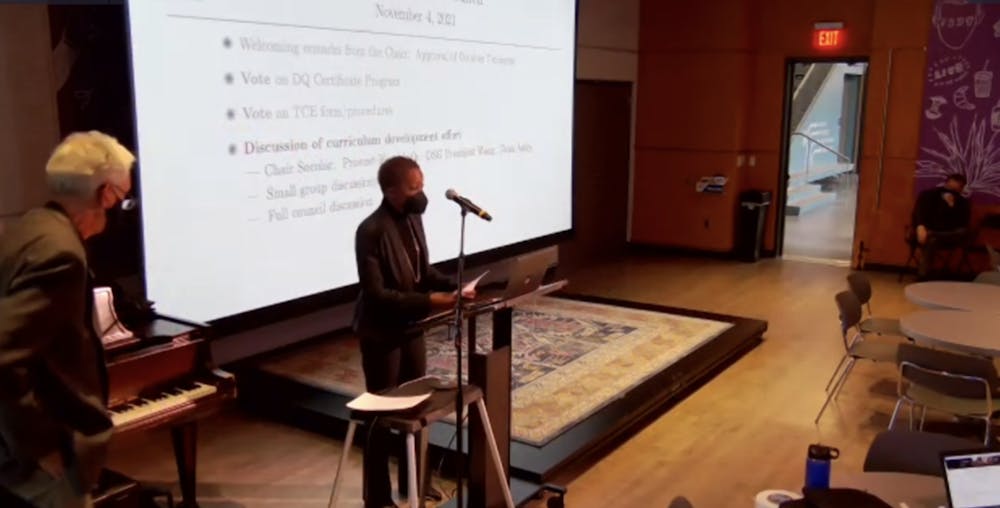What will Duke students be learning 15 years from now? The Arts & Sciences Council kickstarted efforts to answer that question at a hybrid meeting Thursday afternoon.
Trinity College of Arts & Sciences is establishing a committee to revamp the school’s curriculum, aiming to have a proposal completed by the end of spring 2023. The committee will be appointed by Trinity Dean Valerie Ashby and will include representatives from Trinity, Pratt School of Engineering, Nicholas School of the Environment and the Sanford School of Public Policy.
“It seems clear that it is time to revisit the question of what constitutes a world class education for the next generation of students and how we are going to provide that,” said Joshua Socolar, Council chair and professor of physics.
Trinity’s curriculum last received a major upgrade in 1999. Both Socolar and Provost Sally Kornbluth emphasized that current students are growing up in a much different world than the one in which the current curriculum was developed.
“It’s 2021 and we are working from Curriculum 2000,” Kornbluth pointed out.
Duke Student Government President Christina Wang, a senior, addressed the Council regarding curricular improvements students want. One concern was how difficult it currently is for students to explore different fields.
“Students are often scared to fail or try different areas of study if they don’t have previous experience,” Wang said. She suggested having fewer prerequisites or more options for students who typically take certain courses.
Wang also mentioned moving away from the “weed-out” culture that exists in certain introductory courses and towards a more curiosity-driven culture. Additional suggestions included lowering barriers to pursuing an interdepartmental major or Program II and having fewer requirements that “limit [students’] time to pursue their true interests.”
Experiences similar to the Focus Program for upperclass students and more university-wide courses would also allow students to form a stronger intellectual community over shared experiences, Wang said. Additionally, a new curriculum should incorporate data analysis, digital literacy and other skills “to help students stand out in their fields.”
Ashby said that the new curriculum should build on pre-existing strengths.
“Beyond changes to syllabi and individual courses and even at the level of major requirements, we see faculty embracing new kinds of pedagogy and greater integration across different disciplines,” Ashby said. An ideal curriculum would “utilize the knowledge gained from this innovation” and “[strike] a balance between overly prescriptive and completely unstructured.”
Ashby expressed pride in Trinity faculty and in the committee’s ability to develop a new curriculum.
“I have 700 faculty I adore,” she said. “How can I not be confident?”
After initial remarks, meeting attendees formed small groups to discuss two broad priorities and one concern for the development of the new curriculum. Suggestions that came out of those discussions included creating a universal senior thesis or research project, designing a curriculum that is a “magnet” for prospective students, providing more support for collaborative learning experiences and finding new ways to cultivate information and data literacy.
In other business
The Council approved the Digital Intelligence certificate program and new course evaluation system presented at the Oct. 7 Council meeting.
Under the new course evaluation system, reviews will be “shareable” unless instructors opt out.
Christine Folch, assistant professor of cultural anthropology, raised concerns about bias in reviews, particularly against female instructors of color, and implications of those comments for tenure, promotion and future course enrollment.
Thomas Nechyba, professor of economics and chair of the assessment committee, responded that the new system was designed while keeping in mind how students might respond to prompts. He said that any problematic comments would be flagged.
Get The Chronicle straight to your inbox
Sign up for our weekly newsletter. Cancel at any time.

Nadia Bey, Trinity '23, was managing editor for The Chronicle's 117th volume and digital strategy director for Volume 118.

